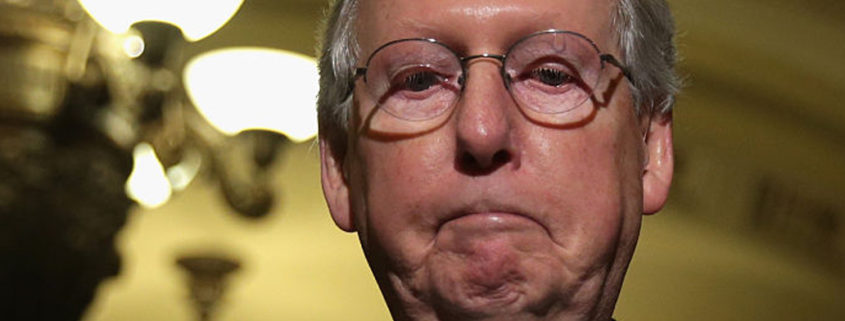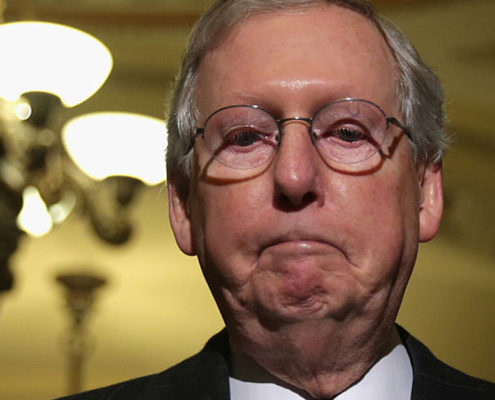Trump and McConnell Locked in a Cold War, Threatening the G.O.P. Agenda
Alexander Burns and Jonathan Martin
August 22, 2017
The relationship between President Trump and Senator Mitch McConnell, the majority leader, has disintegrated to the point that they have not spoken to each other in weeks, and Mr. McConnell has privately expressed uncertainty that Mr. Trump will be able to salvage his administration after a series of summer crises.
What was once an uneasy governing alliance has curdled into a feud of mutual resentment and sometimes outright hostility, complicated by the position of Mr. McConnell’s wife, Elaine L. Chao, in Mr. Trump’s cabinet, according to more than a dozen people briefed on their imperiled partnership. Angry phone calls and private badmouthing have devolved into open conflict, with the president threatening to oppose Republican senators who cross him, and Mr. McConnell mobilizing to their defense.
The rupture between Mr. Trump and Mr. McConnell comes at a highly perilous moment for Republicans, who face a number of urgent deadlines when they return to Washington next month. Congress must approve new spending measures and raise the statutory limit on government borrowing within weeks of reconvening, and Republicans are hoping to push through an elaborate rewrite of the federal tax code. There is scant room for legislative error on any front.
A protracted government shutdown or a default on sovereign debt could be disastrous — for the economy and for the party that controls the White House and both chambers of Congress.
Yet Mr. Trump and Mr. McConnell are locked in a political cold war. Neither man would comment for this story. Don Stewart, a spokesman for Mr. McConnell, noted that the senator and the president had “shared goals,” and pointed to “tax reform, infrastructure, funding the government, not defaulting on the debt, passing the defense authorization bill.”
Still, the back-and-forth has been dramatic.
In a series of tweets this month, Mr. Trump criticized Mr. McConnell publicly, then berated him in a phone call that quickly devolved into a profane shouting match.
During the call, which Mr. Trump initiated on Aug. 9 from his New Jersey golf club, the president accused Mr. McConnell of bungling the health care issue. He was even more animated about what he intimated was the Senate leader’s refusal to protect him from investigations of Russian interference in the 2016 election, according to Republicans briefed on the conversation.
Mr. McConnell has fumed over Mr. Trump’s regular threats against fellow Republicans and criticism of Senate rules, and questioned Mr. Trump’s understanding of the presidency in a public speech. Mr. McConnell has made sharper comments in private, describing Mr. Trump as entirely unwilling to learn the basics of governing.
In off hand remarks, Mr. McConnell has expressed a sense of bewilderment about where Mr. Trump’s presidency may be headed, and has mused about whether Mr. Trump will be in a position to lead the Republican Party into next year’s elections and beyond, according to people who have spoken to him directly.
While maintaining a pose of public reserve, Mr. McConnell expressed horror to advisers last week after Mr. Trump’s comments equating white supremacists in Charlottesville, Va., with protesters who rallied against them. Mr. Trump’s most explosive remarks came at a news conference in Manhattan, where he stood beside Ms. Chao. (Ms. Chao, deflecting a question about the tensions between her husband and the president she serves, told reporters, “I stand by my man — both of them.)
Mr. McConnell signaled to business leaders that he was deeply uncomfortable with Mr. Trump’s comments: Several who resigned advisory roles in the Trump administration contacted Mr. McConnell’s office after the fact, and were told that Mr. McConnell fully understood their choices, three people briefed on the conversations said.
Mr. Trump has also continued to badger and threaten Mr. McConnell’s Senate colleagues, including Senator Jeff Flake of Arizona, whose Republican primary challenger was praised by Mr. Trump last week.






